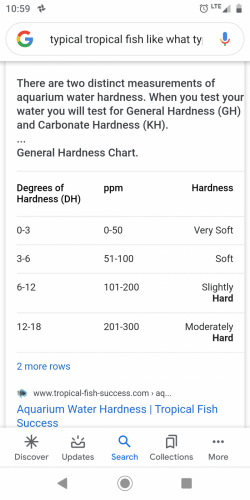Tony blazer
Fish Fanatic
If a moderator thinks that this post is better off in a different thread please move.
Hello I am pretty new on this forum but not to the hobby. I never really believed in chasing hardness or pH for my aquariums. I've always had very productive longevity with any aquariums that I set up in my four decades involved in the hobby.
This is my dilemma and I don't understand this need help
I was at my pool store and I asked the guy to test my hardness of my tap water with their fairly new Hi-Tech water scanner.
My tap water was 44ppm which I then converted using 17.8 =1DGH
my tap water was 2.5 DGH (degrees general hardness)
He then tested some of my aquarium water
Which read 106 PPM so using the same conversion formula my tank water was 6.0 DGH
How can my aquarium be harder water then the water I put into it every week. I do an 18 to 25% water change every week. I have a 55 gallon tank so I'm basically replacing 100% of my water every 4 to 5 weeks.
I then used a API test strip.
My GH was 60
My KH was 80
So using the equation of 17.8 is equal to 1 degree of hardness
My GH was = 3.4
My KH was = 4.5
I am very confused how my tap water is softer then my tank water confused! Also my my GH is so off from the two tests the pool store was 6.0 and using API test strips was 3.4 I'm beginning to believe that a lot of these fish products are bulshit snake oil and not that accurate.
Hello I am pretty new on this forum but not to the hobby. I never really believed in chasing hardness or pH for my aquariums. I've always had very productive longevity with any aquariums that I set up in my four decades involved in the hobby.
This is my dilemma and I don't understand this need help
I was at my pool store and I asked the guy to test my hardness of my tap water with their fairly new Hi-Tech water scanner.
My tap water was 44ppm which I then converted using 17.8 =1DGH
my tap water was 2.5 DGH (degrees general hardness)
He then tested some of my aquarium water
Which read 106 PPM so using the same conversion formula my tank water was 6.0 DGH
How can my aquarium be harder water then the water I put into it every week. I do an 18 to 25% water change every week. I have a 55 gallon tank so I'm basically replacing 100% of my water every 4 to 5 weeks.
I then used a API test strip.
My GH was 60
My KH was 80
So using the equation of 17.8 is equal to 1 degree of hardness
My GH was = 3.4
My KH was = 4.5
I am very confused how my tap water is softer then my tank water confused! Also my my GH is so off from the two tests the pool store was 6.0 and using API test strips was 3.4 I'm beginning to believe that a lot of these fish products are bulshit snake oil and not that accurate.


:strip_icc()/GettyImages-520302084-58408c843df78c0230379568.jpg)
